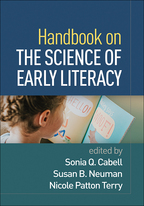Handbook on the Science of Early Literacy
Edited by Sonia Q. Cabell, Susan B. Neuman, and Nicole Patton Terry
Foreword by David K. Dickinson
Introduction, Sonia Q. Cabell, Susan B. Neuman, and Nicole Patton Terry
I. Conceptualizing the Science of Early Literacy
1. Simplicity Meets Complexity: Expanding the Simple View of Reading with the Direct and Indirect Effects Model of Reading, Young-Suk Grace Kim
3. Prioritizing Dual Language Learners’ Language Comprehension Development to Support Later Reading Achievement, Jeannette Mancilla-Martinez
4. Early Literacy, Response to Intervention, and Multi-Tiered Systems of Support, Dayna Russell Freudenthal, Mai W. Zaru, and Stephanie Al Otaiba
5. The Neuroscience of Early Literacy Development, Rachel R. Romeo
II. Development and Instruction of Code-Related Literacy Skills
6. Learning the Code, Barbara R. Foorman
7. The Science of Early Alphabet Instruction: What We Do and Do Not Know, Shayne B. Piasta
8. Invented Spelling: An Integrative Review of Descriptive, Correlational, and Causal Evidence, Monique Sénéchal, Gene Ouellette, and H. N. Lam Nguyen
9. Early Spelling Development: Influences, Theory, and Educational Implications, Nenagh Kemp and Rebecca Treiman
10. Supporting Students’ Early Writing Development through Data-Based Instruction, Kristen L. McMaster, Seyma Birinci, Emma Shanahan, and Erica Lembke
III. Development and Instruction of Meaning-Related Literacy Skills
11. Language Is the Basis of Skilled Reading Comprehension, Laura M. Justice and Hui Jiang
12. Language Interventions in Early Childhood: Summary and Implications from a Multistudy Program of Research, Beth M. Phillips
13. Content Literacy: Integrating Social Studies and Language, Sharolyn D. Pollard-Durodola and Jorge E. Gonzalez
14. Supporting Integrated Instruction in Science and Literacy in K-2 Classrooms, Tanya S. Wright and Amelia Wenk Gotwals
15. Leveraging Content-Rich English Language Arts Instruction in the Early Grades to Improve Children’s Language Comprehension, Sonia Q. Cabell and HyeJin Hwang
16. Feeding Two Birds with One Hand: Instructional Simultaneity in Early Literacy Education, Nell K. Duke, Julia B. Lindsey, and Crystal N. Wise
17. Comprehension: From Language to Reading, Ellen Orcutt, Victoria Johnson, and Panayiota Kendeou
IV. Using the Science of Early Literacy in Professional Development and Family Engagement
18. Measuring and Improving Teachers’ Knowledge in Early Literacy, Anne E. Cunningham, Allison R. Firestone, and Mónica Zegers
19. Professional Development in Early Language and Literacy: Using Data to Balance Effectiveness and Efficiency, Annemarie H. Hindman and Barbara A. Wasik
20. Using the Science of Early Literacy to Design Professional Development for Writing, Hope K. Gerde and Gary E. Bingham
21. Structuring Adaptations for Scaling Up Evidence-Based Literacy Interventions, James S. Kim and Douglas Mosher
22. Together We Can Do So Much: Aligned School and Home Efforts Using a Multi-Tiered System of Support Framework, Tricia A. Zucker, Gloria Yeomans-Maldonado, Sarah Surrain, and Susan H. Landry
23. Family Engagement for Early Literacy: Interventions That Promote Family-School Partnerships, Karalynn E. Brown and Susan M. Sheridan
V. Using the Science of Early Literacy to Support Equity
24. Literacy Architectures: Making the Case for Systems of Learning and Teaching to Cultivate Readers and Writers in Linguistically Diverse Schools, Emily Phillips Galloway and Nonie K. Lesaux
25. The Development of Early Orthographic Representations in Children: The Lexical Asymmetry Hypothesis and Its Implications for Children with Dyslexia, Donald L. Compton, Laura M. Steacy, Nuria Gutiérrez, Valeria M. Rigobon, Ashley A. Edwards, and Nancy C. Marencin
26. Developmental Language Disorder: What It Is and Why It Matters, Maura Curran and Tiffany Hogan
27. Autism and Early Literacy: The State of the Science, Kelly Whalon and Veronica P. Fleury
28. Multi-Tiered Systems of Support: An Approach for Reducing Disparities in School Readiness and Increasing Equity in Early Literacy and Learning Opportunities for Young Children, Judith J. Carta and Charles R. Greenwood
29. Factors Associated with Black Children’s Early Development and Learning, Iheoma U. Iruka, Amber B. Sansbury, Nicole A. Telfer, Nneka Ibekwe-Okafor, Nicole Gardner-Neblett, and Tonia R. Durden
VI. Using the Science of Early Literacy to Learn Across Boundaries
30. Early Literacy in Everyday Spaces: Creating Opportunities for Learning, Susan B. Neuman
31. Digital Picture Books: Opportunities and Utilities, Adriana G. Bus and Trude Hoel
32. e-Books with a Digital Dictionary as a Support for Word Learning, Ofra Korat and Ora Segal-Drori
33. Leveraging Research-Practice Partnerships to Support Evidence Use in Early Childhood: Lessons Learned from Atlanta 323, Nicole Patton Terry, Gary E. Bingham, Anita Faust Berryman, Janelle Clay, and Kate Caton
Index




